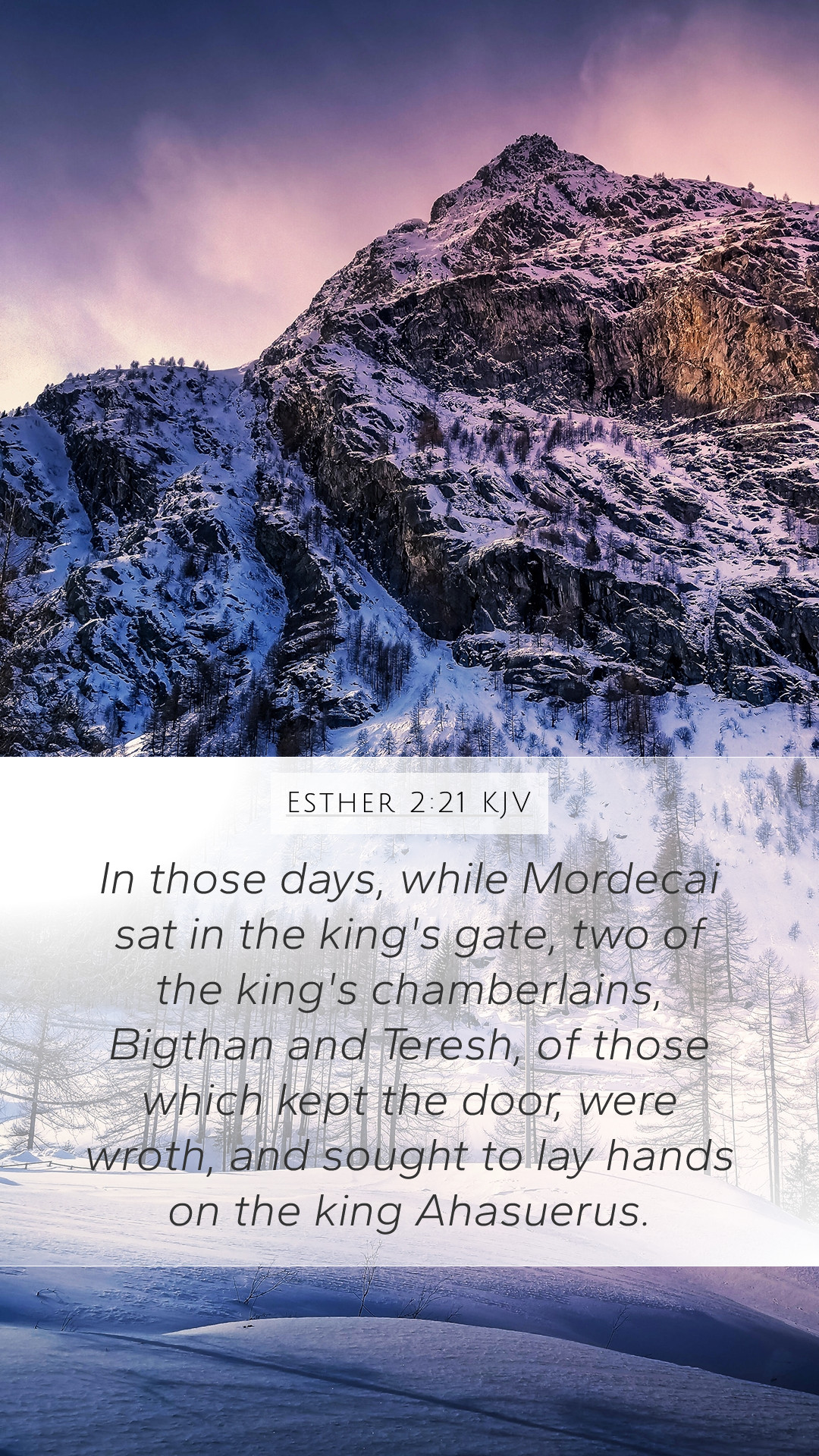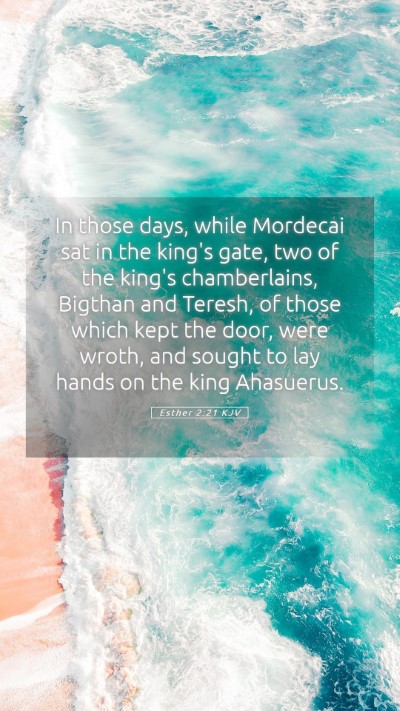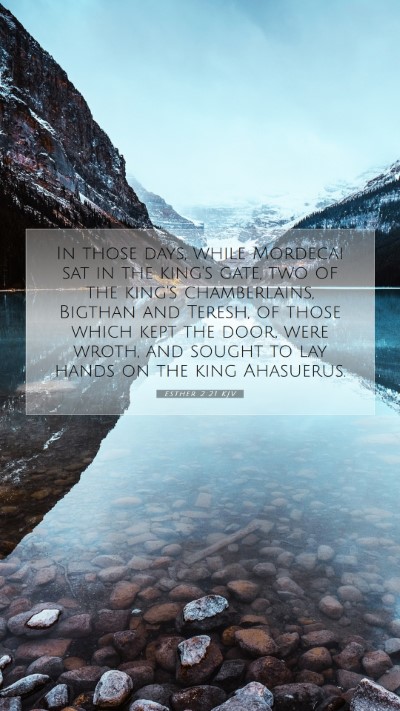Old Testament
Genesis Exodus Leviticus Numbers Deuteronomy Joshua Judges Ruth 1 Samuel 2 Samuel 1 Kings 2 Kings 1 Chronicles 2 Chronicles Ezra Nehemiah Esther Job Psalms Proverbs Ecclesiastes Song of Solomon Isaiah Jeremiah Lamentations Ezekiel Daniel Hosea Joel Amos Obadiah Jonah Micah Nahum Habakkuk Zephaniah Haggai Zechariah MalachiEsther 2:21 Meaning
What is the meaning of Esther 2:21?
In those days, while Mordecai sat in the king's gate, two of the king's chamberlains, Bigthan and Teresh, of those which kept the door, were wroth, and sought to lay hands on the king Ahasuerus.
Esther 2:21 Bible Verse Meaning
Bible Verse Meaning and Commentary on Esther 2:21
Esther 2:21 (KJV): "In those days, while Mordecai sat in the king's gate, two of the king's chamberlains, Bigthan and Teresh, of those which kept the door, were wroth, and sought to lay hands on the king Ahasuerus."
This verse introduces a pivotal moment in the Book of Esther, serving as a crucial transition towards the unfolding events that will impact the Jewish people. Below, we offer an in-depth Bible verse interpretation that combines insights from public domain commentaries by Matthew Henry, Albert Barnes, and Adam Clarke.
Historical Context
The Book of Esther is set in the Persian Empire during the reign of King Ahasuerus (traditionally identified with Xerxes I). The narrative conveys themes of providence, identity, and courage in the face of adversity.
Summary of Esther 2:21
This verse highlights Mordecai's loyalty and vigilance. While sitting at the king's gate, he overhears a conspiracy against King Ahasuerus, revealing his role not only as a member of the royal court but as a protector of the king. This section signifies the beginning of Mordecai's prominence in the narrative.
Insights from Commentary
- Matthew Henry: Comments on the significance of Mordecai’s position at the king's gate, noting that this was a place of authority and influence. Henry emphasizes how God uses everyday situations to achieve His purposes and protect His people.
- Albert Barnes: Highlights the importance of Mordecai's discovery of the plot. Barnes points out that this act of bravery ultimately leads to divine favor. He notes that this event foreshadows the loyalty and commitment that Mordecai will continue to demonstrate throughout the book.
- Adam Clarke: Focuses on the characters involved in the plot against the king. Clarke suggests that even those who are close to power can harbor sinister intentions, indicating the corrupt nature of mankind. He underlines the impact of Mordecai's timely warning, which not only saves the king but also sets the stage for future deliverance for the Jewish people.
Application of Esther 2:21
This passage encourages believers to be alert and faithful in their roles, just as Mordecai was. There are several key applications for understanding Scripture in this context:
- Vigilance: Just as Esther and Mordecai navigated the complexities of life in a foreign land, modern believers are called to be watchful in their lives, discerning the dangers that may exist around them.
- Active participation in God's plan: Mordecai's actions demonstrate that individuals can play critical roles in God’s providence. Believers should seek to understand their unique positions and how they can contribute to the greater good.
- Faith in divine timing: The unfolding events in the Book of Esther show that God's timing is perfect. Readers are reminded to trust that even struggles and trials can be part of a larger plan.
Cross References
Esther 2:21 can be cross-referenced with the following verses that shed further light on related themes:
- Proverbs 21:1: "The king’s heart is in the hand of the LORD, as the rivers of water: he turneth it whithersoever he will."
- Psalm 33:10-11: "The LORD bringeth the counsel of the heathen to nought: he maketh the devices of the people of none effect. The counsel of the LORD standeth for ever, the thoughts of his heart to all generations."
- Esther 4:14: "For if thou altogether holdest thy peace at this time, then shall there enlargement and deliverance arise to the Jews from another place; but thou and thy father's house shall be destroyed: and who knoweth whether thou art come to the kingdom for such a time as this?"
Conclusion
The rich tapestry of Esther 2:21 encourages a deep understanding of Scripture. Through the lens of Bible verse commentary, we see how God's providence operates through ordinary people in extraordinary circumstances. By nurturing an awareness of our roles and remaining faithful, we align ourselves with God's purpose. This passage invites readers to reflect on their own life situations and consider how they might serve God's plan, gaining valuable Bible study insights.


